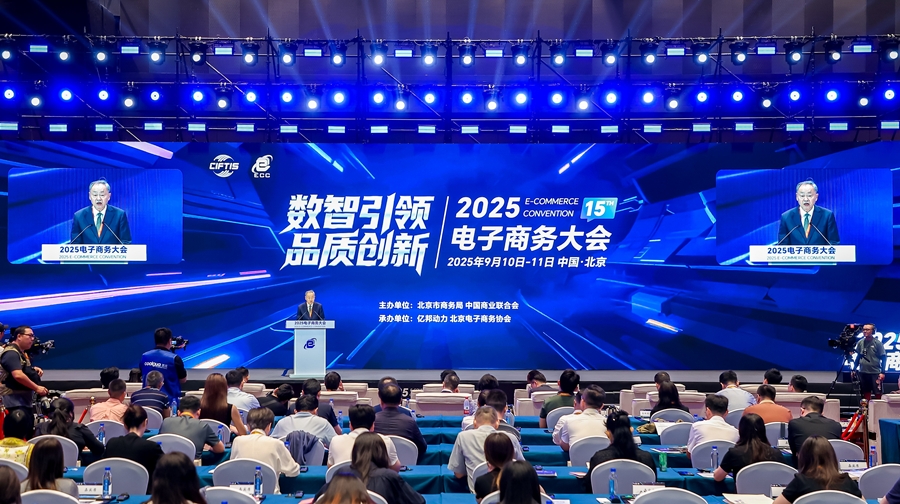The E-Commerce Convention 2025 commenced on Wednesday in Beijing as part of the China International Fair for Trade in Services (CIFTIS), highlighting how digital technologies, intelligent solutions, and quality innovation are driving industry growth.
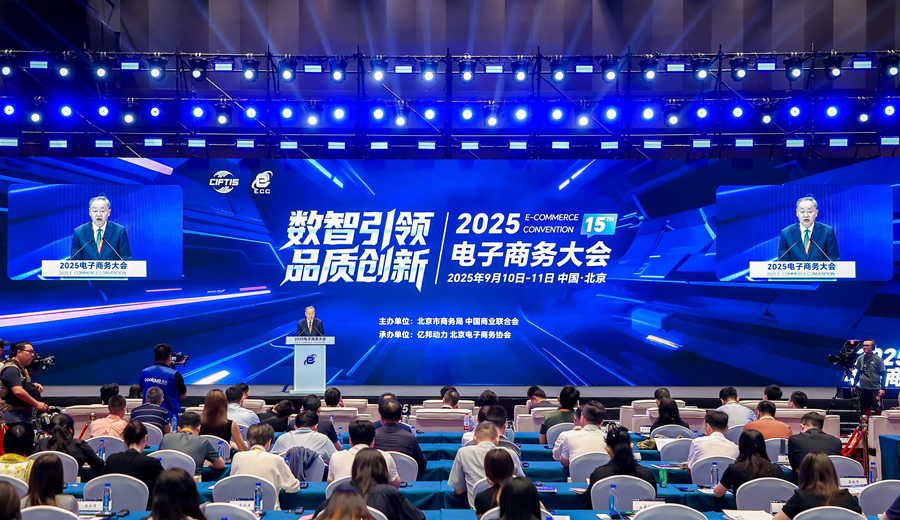
Jiang Ming, president of the China General Chamber of Commerce, speaks at the opening of The E-Commerce Convention 2025 held during the 2025 China International Fair for Trade in Services in Beijing, Sept. 10, 2025. [Photo courtesy of Beijing E-Commerce Association]
Over 500 participants attended the opening ceremony and main forum, including officials from the Ministry of Commerce, commerce authorities from more than 20 provinces, municipalities and autonomous regions, relevant departments of the Beijing municipal government, as well as representatives from district commerce bureaus and domestic and international e-commerce enterprises.
Jiang Ming, president of the China General Chamber of Commerce, said the ongoing revolution in digital intelligence technologies — driven by artificial intelligence and big data — together with the growing emphasis on enhanced consumer experiences and brand value, are emerging as two core engines of industry development.
Jiang emphasized the strategic role of e-commerce in today's economy. "E-commerce, as a critical junction integrating the digital economy and the real economy, serves as both an accelerator for high-quality national economic development and a service station for improving people's quality of life," he said.
"We must adhere to innovation-driven strategies and quality as the foundation, enabling e-commerce to play a greater role in expanding domestic demand, connecting domestic and international markets, and empowering industries."
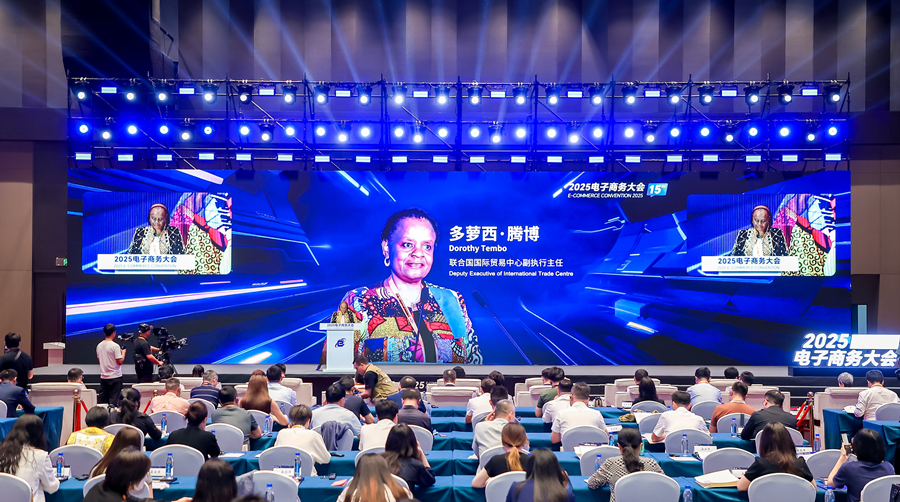
Dorothy Tembo, deputy executive of the International Trade Centre, speaks at the opening of The E-Commerce Convention 2025 held during the 2025 China International Fair for Trade in Services in Beijing, Sept. 10, 2025. [Photo courtesy of Beijing E-Commerce Association]
Dorothy Tembo, deputy executive of the International Trade Centre (ITC), said that as a joint agency of the World Trade Organization (WTO) and the United Nations, ITC is helping global small and medium-sized enterprises (SMEs) enhance their competitiveness through cross-border e-commerce.
She noted new U.S. tariff measures and the pressure on SMEs to adapt to AI transformation have created multiple challenges. She emphasized the crucial role of international cooperation and acknowledged China's policy practices, as well as acknowledging international contributions from the world's largest B2C e-commerce market.
During the convention, Liu Yanfang, executive president of the China International Electronic Commerce Center Research Institute, released a report on how "AI plus" drives the expansion and quality improvement of digital service consumption. She noted that with the continuous development of digital technology, online service consumption is becoming a new growth point for e-commerce.
"The widespread application of AI plus in the service consumption sector has promoted the digital and intelligent upgrade of services, expanded the boundaries of service consumption, and enhanced the consumer service experience, making it a key force driving e-commerce growth," she said.
Several entrepreneurs, including representatives from Amazon, Alibaba Group, Meituan and more, shared their vision and insights at the main forum.
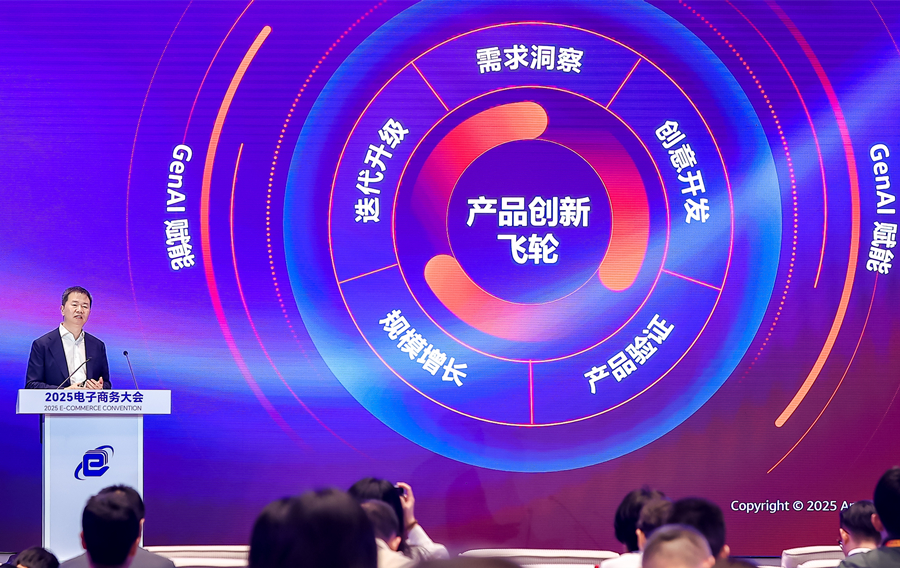
Qiu Sheng, vice president of Amazon China, speaks at the opening of The E-Commerce Convention 2025 held during the 2025 China International Fair for Trade in Services in Beijing, Sept. 10, 2025. [Photo courtesy of Beijing E-Commerce Association]
Qiu Sheng, vice president of Amazon China, highlighted the company's role in supporting brand globalization. He noted that cross-border e-commerce is experiencing rapid growth, and innovation has become essential for brands seeking to stand out in the global marketplace. Through enhanced platform services, data-driven insights, and marketing tools, Amazon has helped thousands of Chinese brands overcome geographical barriers, shifting from simple product exports to building strong brand identities in overseas markets.
Han Xi, vice president of Alibaba Group, outlined the transformative role of artificial intelligence in e-commerce during his keynote address on the intelligent revolution driving the industry's next stage of development. He stressed that AI-powered e-commerce has become an irreversible trend, with AI technologies now integrated across the value chain — from intelligent product selection and precision marketing to personalized consumer services.
"Leveraging AI technology, e-commerce platforms can achieve more efficient operations and more accurate customer insights, providing consumers with a more personalized and intelligent shopping experience. In the future, AIGC will further reduce merchant operational costs and activate innovation potential," he said.
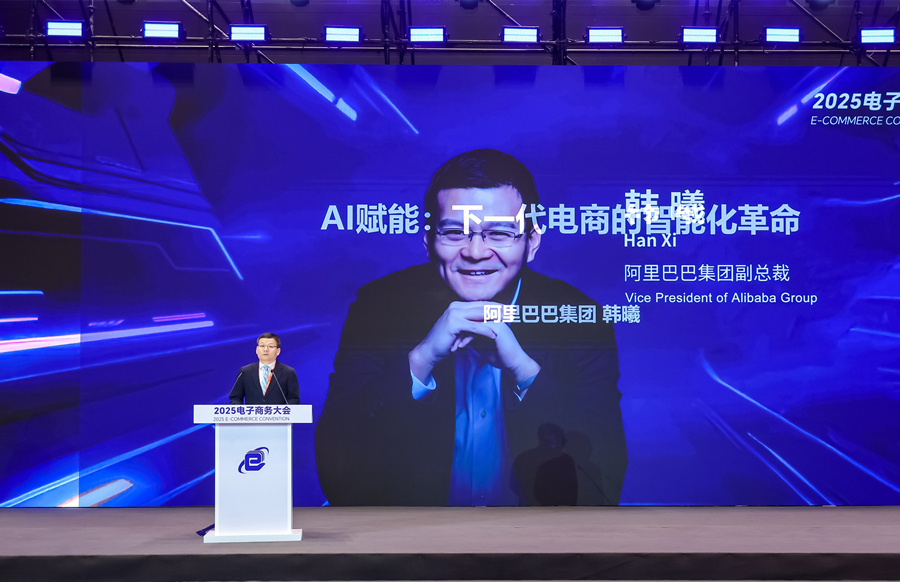
Han Xi, vice president of Alibaba Group, speaks at the opening of The E-Commerce Convention 2025 held during the 2025 China International Fair for Trade in Services in Beijing, Sept. 10, 2025. [Photo courtesy of Beijing E-Commerce Association]
The E-Commerce Convention has been held annually since 2011, marking its 15th consecutive year. As a key component of CIFTIS, it has grown into an international, professional platform for exchanging leading e-commerce ideas, showcasing innovations, and tracking emerging industry trends. This year's convention features three specialized sessions — consumer e-commerce, cross-border e-commerce, and industrial e-commerce — highlighting the latest developments, achievements, and new opportunities across the sector.


 Share:
Share: 




 京公網(wǎng)安備 11010802027341號
京公網(wǎng)安備 11010802027341號